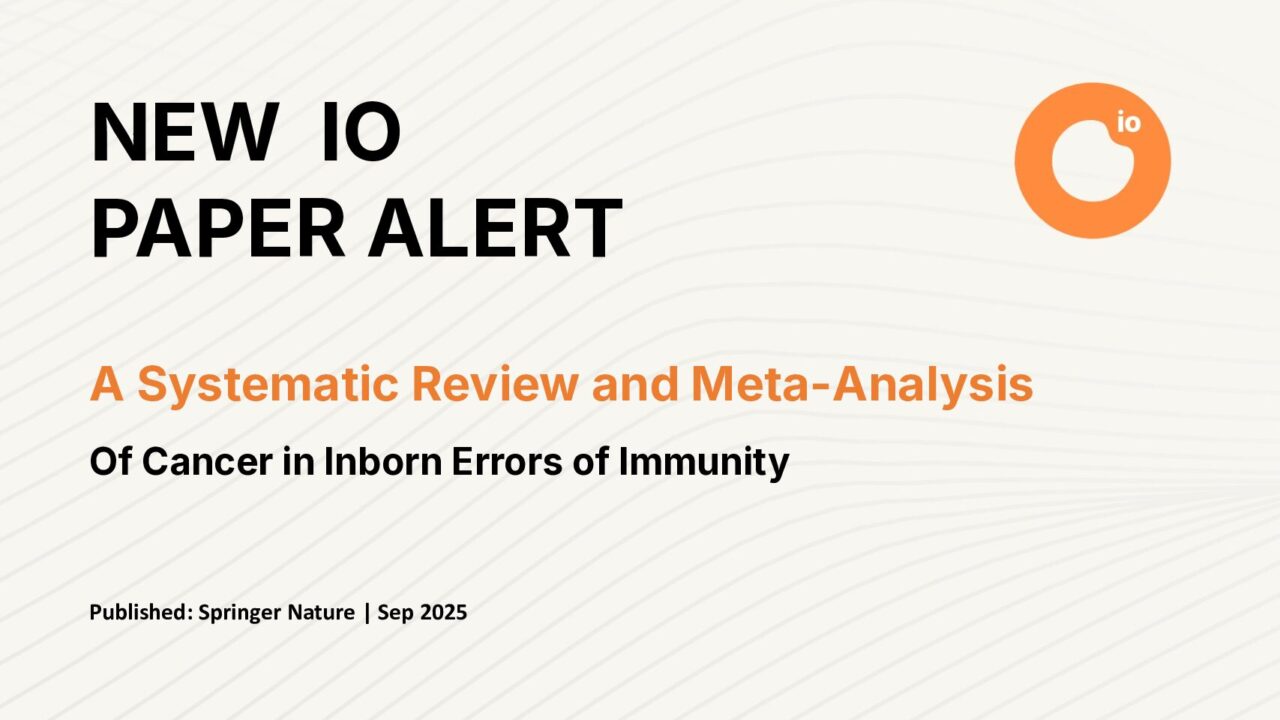This research, published in Springer Nature Link, provides the largest systematic review and meta-analysis to date of cancer in patients with inborn errors of immunity (IEI). By analyzing 4607 reported IEI cases with malignancy and pooling 87 cohort studies, the investigators establish a cancer frequency rate of 12%—approximately 40 times higher than in the general population. The work highlights striking differences in cancer incidence, type, and outcomes across IEI subtypes, with hematologic cancers dominating and genetic defects such as NBS, XLP, Fanconi anemia, BRCA2, and ATM conferring particularly high risks.
Original Study Title: Systematic Review and Meta-Analysis of Cancer Frequency in Patients with Inborn Errors of Immunity
Authors: Saba Fekrvand, Hassan Abolhassani, Zahra Hamidi Esfahani, Najmeh Nameh Goshay Fard, Mahboube Amiri, Helia Salehi, Amir Almasi-Hashiani, Ali Saeedi-Boroujeni, Nazanin Fathi, Maryam Mohtashami, Azadehsadat Razavi, Arash Heidari, Gholamreza Azizi, Shaghayegh Khanmohammadi, Milad Ahangarzadeh, Kiarash Saleki, Gholamreza Hassanpour, Nima Rezaei and Reza Yazdani
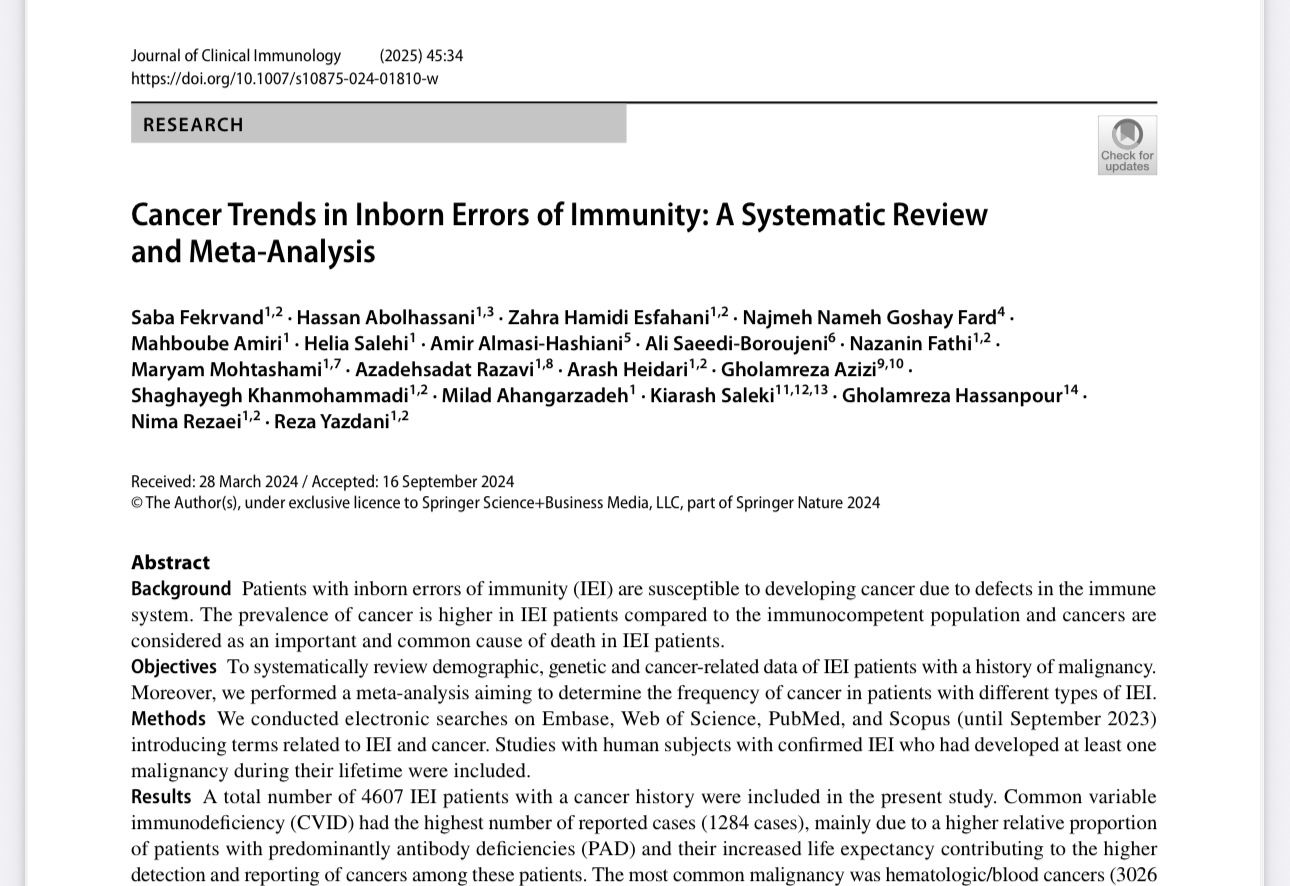
Introduction
Inborn errors of immunity (IEI), also known as primary immunodeficiency disorders, are a heterogeneous group of genetic diseases characterized by defective immune function. Patients with IEI are not only prone to recurrent infections but also face a significantly elevated risk of malignancy. Cancer in IEI tends to manifest earlier in life, is frequently aggressive, and is often a major cause of mortality. Although individual reports have highlighted this association, a systematic and quantitative overview of cancer frequency and outcomes across IEI subtypes has been lacking.
This systematic review and meta-analysis, published in Springer Nature Link, addresses this gap by analyzing over 4,600 IEI patients with cancer and synthesizing data from nearly 90 cohort studies. The findings provide a comprehensive picture of cancer epidemiology in IEI and underscore the urgent need for tailored cancer screening and management strategies in this vulnerable population.
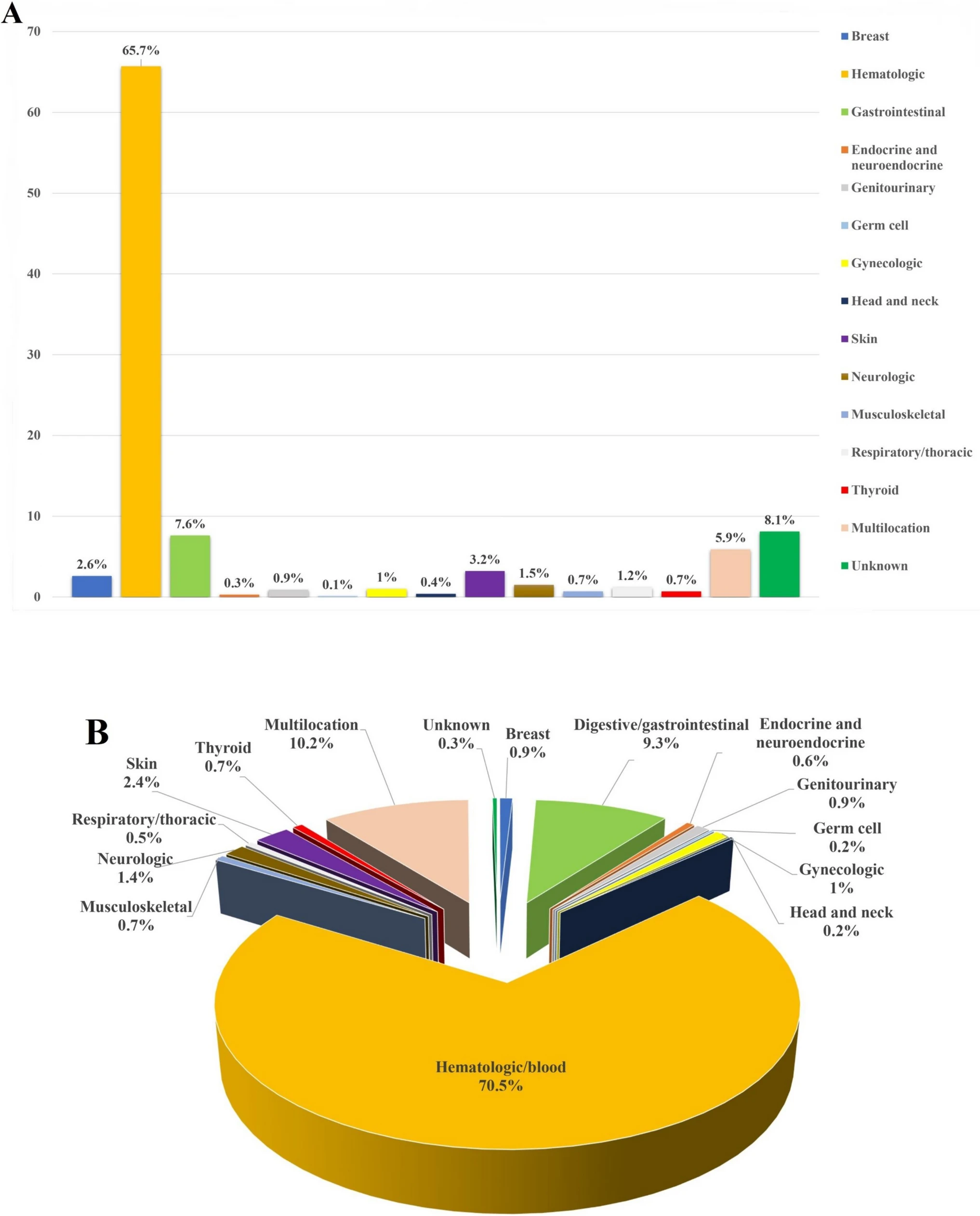
Methods
This was a systematic review and meta-analysis conducted according to PRISMA guidelines. A comprehensive search of PubMed, Embase, Web of Science, and Scopus was performed. Eligible studies included human subjects with confirmed inborn errors of immunity (IEI) who had developed at least one malignancy during their lifetime. Case reports, case series, cross-sectional studies, and cohort studies were considered.
From each study, demographic, genetic, and cancer-related variables were extracted. Patients were classified using three complementary frameworks:
- IUIS classification (non-syndromic CID, syndromic CID, PAD, immune dysregulation, phagocytic disorders, defects in innate immunity, autoinflammatory disorders, complement deficiencies, bone marrow failure, and phenocopies).
- Monogenic IEI defects (e.g., ATM, NBS1, BRCA2).
- Cases with no genetic diagnosis (e.g., CVID, SIgAD).
The primary endpoint was the frequency of cancer across different IEI categories. A random-effects model was applied to estimate pooled cancer incidence. Subgroup analyses assessed variation by IEI subtype. Secondary endpoints included cancer-related mortality, cure frequency, and survival outcomes, which were analyzed using Kaplan–Meier curves and log-rank tests.
Results
- Cohort Description: A total of 4,607 patients with inborn errors of immunity (IEI) who had developed cancer were included in this systematic review. Among them, 1,928 patients had sufficiently detailed data to allow for statistical analysis.
- Cancer Frequency: The pooled cancer frequency among IEI patients was 12% (95% CI: 10.6–13.5%), which is approximately 40 times higher than the global cancer prevalence of 0.29%.
Subtype Patterns
- Common variable immunodeficiency (CVID) accounted for the largest absolute number of cases (1,284 patients).
- Nijmegen breakage syndrome (NBS1) deficiency had the highest relative frequency, with cancer occurring in 50.5% of patients.
- ATM deficiency and Fanconi anemia were also strongly associated with cancer development.
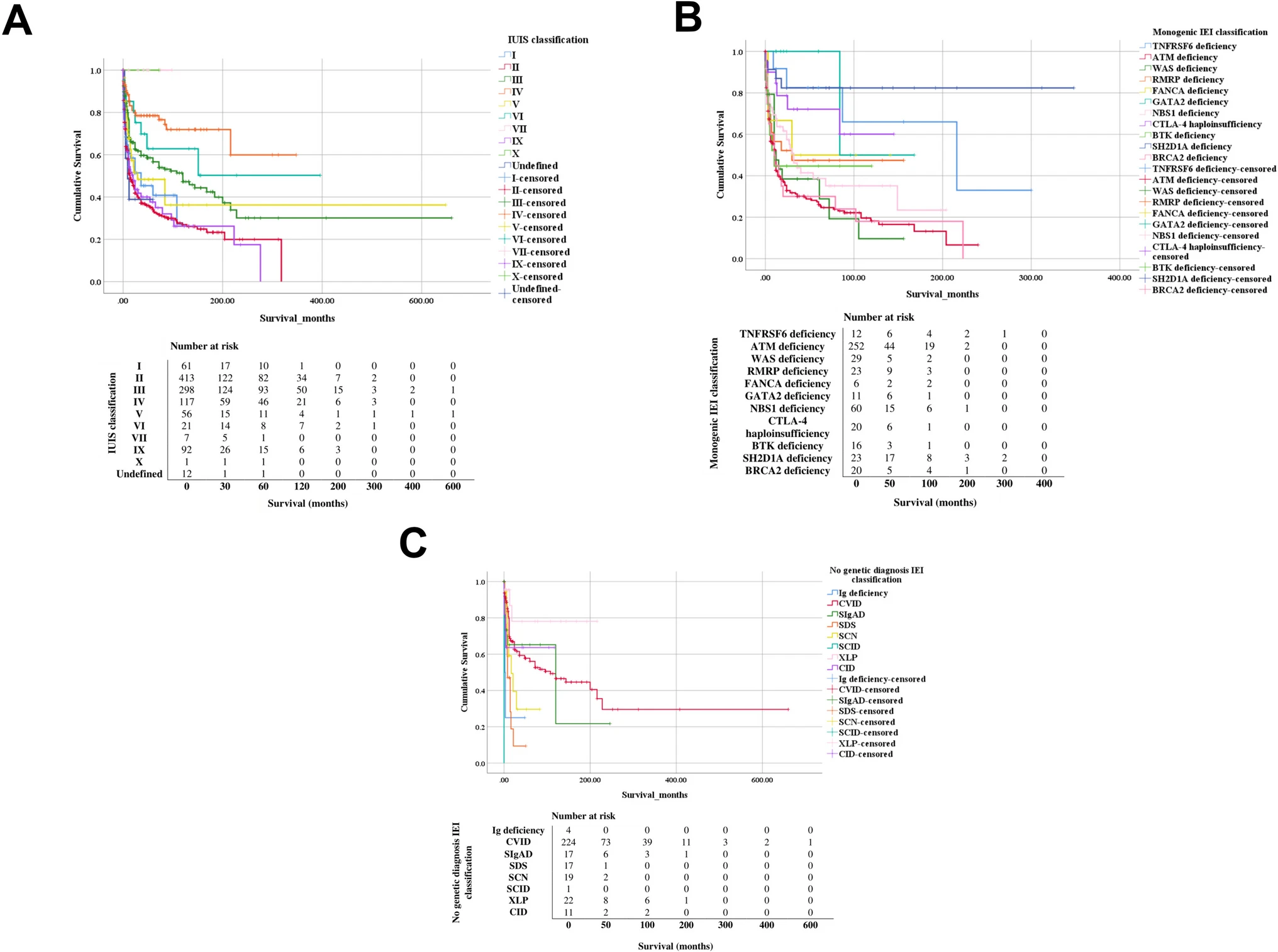
Cancer Types: Hematologic malignancies predominated, representing 65.7% of all cancers, with diffuse large B-cell lymphoma (DLBCL) being the most frequent. Digestive tract cancers were the second most common group, primarily involving the stomach, colorectum, and liver.
Mortality and Outcomes: Among patients with outcome data available, more than half (51.9%) died from cancer. Cure rates remained low compared to the general population.
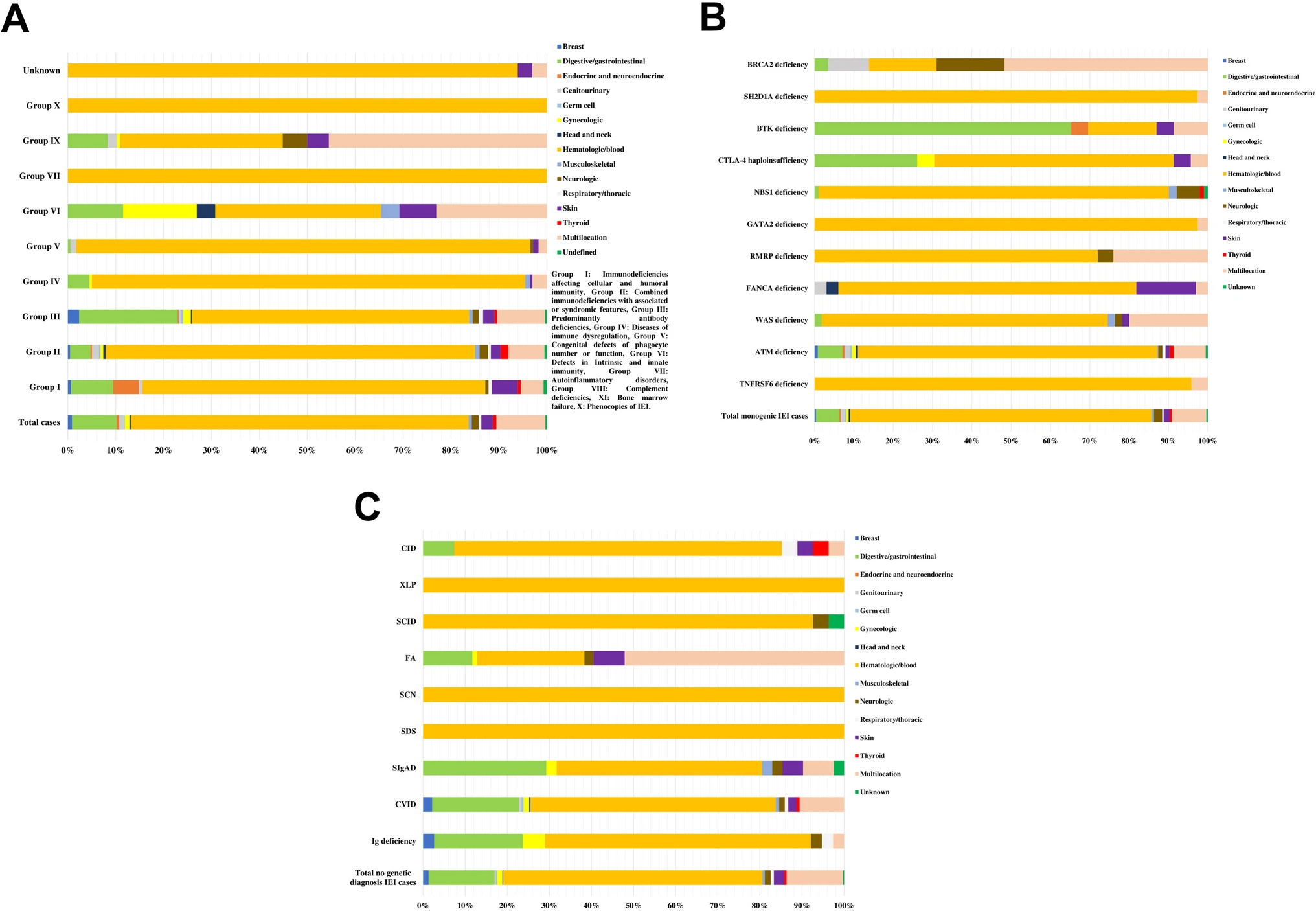
Genetic Insights
- BRCA2 deficiency was associated with the earliest onset of cancer (median age at diagnosis: ~38 months), the lowest likelihood of cure, and the highest fatality rate (85%).
- ATM deficiency carried particularly poor long-term outcomes, with a 72% fatality rate.
Treatment Approaches: Reported cancer treatments included chemotherapy, hematopoietic stem cell transplantation (HSCT), surgery, radiotherapy, and monoclonal antibodies. Rituximab was the most frequently administered targeted agent. Despite these interventions, prognosis for IEI patients remained significantly worse than that of the general population.
Key Takeaway Messages
- High Cancer Burden: Cancer affects 12% of IEI patients, with hematologic malignancies as the leading cause.
- Subtype-Specific Risks: DNA repair defects (NBS1, BRCA2, ATM) and immune dysregulation syndromes (XLP) confer the greatest cancer risk and mortality.
- Early Onset and Poor Prognosis: Many IEI patients develop cancer in childhood or young adulthood, with lower survival compared to the general population.
- Clinical Implications: Individualized surveillance, genetic counseling, and cancer-prevention strategies are essential in IEI care.
- Research Impact: This is the most comprehensive systematic review and meta-analysis to date, establishing a framework for targeted cancer screening in IEI patients.
Written by Toma Oganezova, MD, Editor-in-Chief of OncoDaily IO


